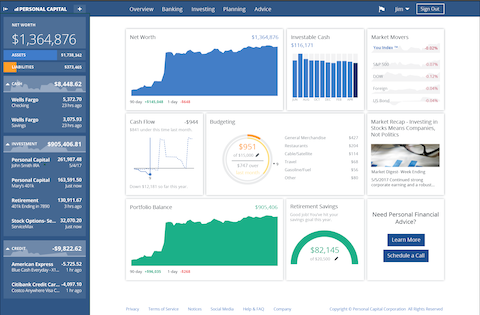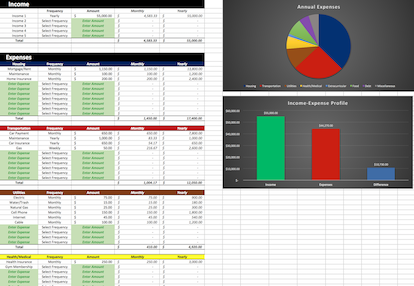
You’ve just received a large unexpected financial windfall. What should you do? Buy a new car? Maybe pay off your mortgage? How much should you save? Is it ok to splurge a little? What about investing?
Whether it’s from an inheritance, an unlikely lottery win, the sale of a business, or a bonus at work, receiving an unexpected windfall can be both extremely exciting and extremely scary. It can also be a life-changing event. Whether it changes your life for the better or for the worse will most likely depend on your subsequent decisions.
So what should you do? Follow these steps and you’ll be well on your way to a more financially secure future!
Step #1 - Take It Slow
Making hasty financial decisions is never a good idea. This is especially true following the receipt of a lump sum of money. Instead of rushing to do something with the money, you should spend some time (a few weeks or even months) analyzing your current financial situation. Do you have a large amount of debt? What are you invested in? How much money do you have saved for emergencies? What are your current expenses? These are the types of questions you should be asking yourself in those first few weeks.
Your goal should be to develop a detailed picture of your finances including all income, debt, savings, investments, bills, and expenses (online tools like Personal Capital and Mint can help with this process). Use this information to help you complete the remaining steps.
Step #2 – Build Your Team
When working in an area that you’re unfamiliar with, it’s usually a good idea to consult with a team of experts. This fact is no different when it comes to money. In the case of a financial windfall, two of the experts you should consider adding to your team are a financial planner (make sure they are a fiduciary) and a certified public accountant and/or tax attorney. These professionals can help you plan the details of how and when to receive the money, give you investment options and advice, provide estate planning advice, and, perhaps most importantly, help you understand the tax implications of everything. Building a good team of experts has the potential to save you huge sums of money in unneeded taxes and expenses, so the cost of their services should be well worth the value they provide.
Note: It is imperative that you understand the tax implications of receiving a financial windfall. Inefficient tax planning could, quite literally, cut the amount you receive in half. Even if you choose to ignore every other step, be sure to consult with a tax attorney/expert before making any other decision.
Step #3 – Pay Off High-Interest Debt
Now that you’ve finished developing your detailed financial picture and constructing your team of experts, it’s time to make your first money move by paying off any high-interest debt you may have. High-interest debt can be a drag on even the best performing investment portfolio, so using your newfound riches to pay it off is a no brainer.
While there are several options to choose from when it comes to debt elimination, I recommend using a “debt avalanche”. This strategy consists of organizing your debts from highest to lowest interest rate and paying the minimum on each of them while applying all additional funds to the debt with the highest interest rate. When one debt is paid off, the funds that were going toward it are then added to the payment for the debt with the next highest interest rate. As I’ve explained before, the avalanche method, paired with a few other techniques, is by far the fastest and cheapest way to erase debt for good.
Step #4 – Emergency Fund
Once you’ve enacted your debt elimination strategy, the next goal should be to shore up your financial foundation. This starts with establishing an emergency fund. If you’re unfamiliar with an emergency fund, it is exactly what it sounds like: A sum of money that you put aside in case of emergencies (e.g. loss of job, expensive auto/home repair, unexpected medical expense, etc.). This fund will provide quick and easy access to liquid cash if the need arises.
I recommend having between 3 and 12 months’ worth of living expenses saved in your emergency fund. Any less than 3 months’ worth and you may not be adequately protected from potential financial emergencies. Any more than 12 months’ worth and you would be allocating money to this fund that could be better spent acquiring investments.
Note: Make sure this money is saved in a high-yield savings account so that your emergency fund will continue to grow automatically over time.
Step #5 – Invest
With your high-interest debt taken care of and your emergency fund established, the majority of the remainder of your windfall should go towards building wealth. Here on GoGreenDollar.com we build wealth by taking advantage of compound growth through investing! If you’re unsure about how to get started, speak with your financial planner (from Step #2) and they should be able to answer any questions you have and help you develop a custom investing strategy based on your goals.
If you’d rather do things on your own (my typical approach) I recommend reviewing our surprisingly simply investment strategy and implementing it with (or without) whatever modifications you deem necessary based on your personal preferences. This strategy is dead simple, requires little maintenance, and is historically one of the most profitable ways to invest.
Step #6 – Splurge!…Within Reason
You’ve organized your assets and liabilities into a complete financial picture, you have a team of financial experts working for you, your debt is being efficiently eliminated, you have 3-12 months’ worth of expenses saved for emergencies, and you’ve put your new investment strategy to work. It’s time to splurge!
Now that your money is working for you, it’s ok to spend a portion of the remainder on something fun. Go on an exotic trip or buy that thing you’ve been wanting but could never responsibly afford. Consider helping out a close family member or friend with a bill or debt they’ve been struggling to pay. As long as you continue to utilize the advice in the steps above, you should feel free to spend as you please (within budget of course).
Final Thoughts
An unexpected financial windfall has the potential to significantly change your life. Following these steps will go a long way toward making sure those changes are for the better.
Tools To Get You Started
Get a head start on your journey toward achieving financial independence by analyzing and tracking your income, expenses, investment performance, and overall net worth with the free online wealth management tool Personal Capital.
We use Personal Capital regularly to analyze our investment fees, track our investments, and project our net worth. We also periodically review our progress toward retirement with their retirement planning calculator.
If you’d rather do things on your own, become a subscriber today and you’ll receive our Free Financial Planning Dashboard. This tool allows you to enter your income and expenses to create a detailed budget. You can use it to track your spending habits over time or just to get an idea of where your money is going each month. Take a look at the automatically generated charts and you may discover you have a little more cash to invest than you thought.
If you’re interested in detailed instructions on how to budget, save, pay off debt, and invest, check out The 6 Phases of Building Wealth. This book provides step-by-step instructions for working through each “Phase” in the process of achieving Financial Freedom. If you're just starting out, the information in this book will provide you with an invaluable resource. You can pick up the digital version for only $2.99 on Amazon.
Disclosure: Some of the links found on this website may be affiliate links. Affiliate links pay GGD a small commission when you click through and/or make a purchase. This is at zero additional cost to you.
Full Disclaimer/Disclosure
Related Posts
-
Best Strategy To Erase Debt, For Good
Debt. It gives us spending flexibility by providing the resources to purchase big-ticket items we’d otherwise be unable to afford. It allows us to delay payment on purchases and to spread the total amount owed…
-
Investment Hierarchy: Top 7 Investments For Retiring Young
When you make the decision to become an early retiree, one of the first things you'll realize is that there are many, many different choices when it comes to investment accounts. 401(k), IRA, HSA, 457,…
-
The 50/30/20 Budget
As I’ve admitted in the past, I don’t keep track of my finances with a conventional budget. Instead, I have implemented a system in which everything happens automatically. Bills are paid automatically, funds are saved/invested…






